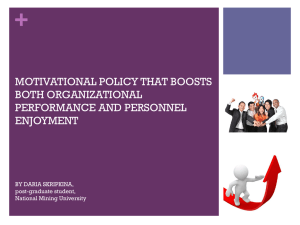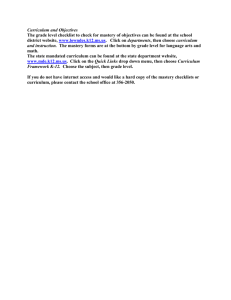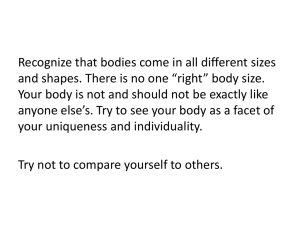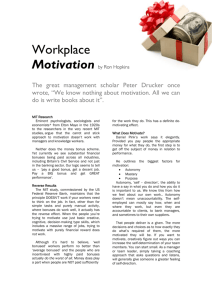Motivation Assessment for Autonomy, Mastery and Purpose
advertisement
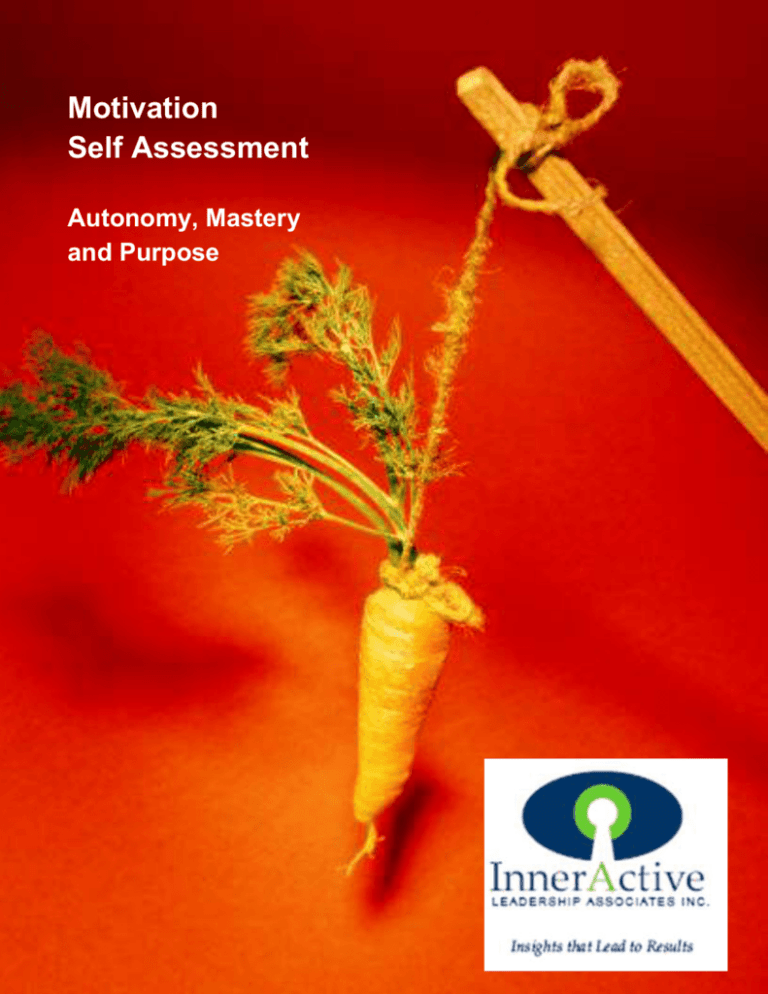
Motivation Self Assessment Autonomy, Mastery and Purpose Motivation Self Assessment What is Motivation? Human beings are motivated by both extrinsic and intrinsic factors. In the workplace today in which creative, non-routine jobs are more the norm than routine jobs, it’s important for work to be built around more intrinsic motivation factors than extrinsic rewards. Extrinsic rewards are exemplified by the traditional carrot and stick management system of rewards like money and status and punishment of poor or inadequate performance. In the past, with more routine and uncreative work, extrinsic rewards were more valuable for motivating people on the job. Intrinsic motivation is not about the external rewards an activity brings or that management provides. Intrinsic motivation is the inherent satisfaction one derives from doing the activity itself. The three key factors that foster intrinsic motivation are autonomy, mastery and purpose. What is Autonomy, Mastery and Purpose? Autonomy Autonomy is the feeling that one’s behaviour is a result of voluntary choice to engage in that behaviour. At work, this typically refers to the ability to control and have choice over the tasks one does, when one does them, the techniques one uses to complete the tasks and the team members with whom one works (task, time, technique and team). Mastery Mastery is the desire to continually strive to get better at a task, skill or behaviour that matters to one personally. At work, this typically means having an “inquiring mind” and the willingness to experiment to come up with new and fresh solutions to problems one is facing. Mastery is a mindset of continuous improvement, coupled with deliberate, effortful, conscious practice and a knowledge that it is impossible to fully achieve perfect mastery. Purpose Purpose is the feeling that one’s work is in service to a cause or objective larger than oneself. At work, this is the desire to make a difference or leave a legacy. It may be described as wanting to contribute in a way that not only maximizes profits and achieves goals but also benefits others, the environment and / or the world in general. Assessing Autonomy, Mastery and Purpose A short assessment follows. Assign yourself points for each statement based on how often the statement is true for you (from almost never to almost always). Total the points in each section and use this total to determine your current rating of autonomy, mastery and purpose. This is not a scientific test but was inspired by the work of Daniel Pink in his book, Drive. © InnerActive Leadership Associates, 2011 Page 2 of 8 Motivation Self Assessment Assessment Scale Use the following rating scale to answer the questions below, indicating how often the statement described is true for you. Please insert the number that corresponds with your rating. 1 2 3 . . 9 10 Rarely / Almost Never to 10% of the time 20% of the time 30% of the time 90% of the time Almost Always to 100% of the time Section 1: Autonomy Autonomy Statement Rating 1. I have the latitude to set the goals that I think are most appropriate to meet the organization’s mission and objectives. 2. I have the freedom at work to choose the tasks that I think will make the most difference to my goals. 3. At work, I have the ability to schedule my work as I see fit. 4. I am able to attend or not attend meetings without negative repercussions based on my perception of the meetings’ relevance and importance to me and my goals. 5. I have the freedom to complete goals / tasks in the manner that I believe is best. 6. I am able to work with team members with whom I choose to complete my goals. 7. In my work, I am measured on my results, not the time / hours I put into the results. 8. I am able to flex my daily hours to best meet my work and personal commitments. 9. I have the freedom to lead my team in the manner that I feel is best. 10. I have significant input into how my performance or success in my job is measured. TOTAL SCORE out of 100 possible points © InnerActive Leadership Associates, 2011 Page 3 of 8 Motivation Self Assessment Section 2: Mastery Mastery Statement Rating 1. I often get so absorbed in my work that I lose track of time. 2. I have clear objectives at work. 3. I receive regular feedback at work from my leader. 4. Time passes quickly for me at work because I am so engaged in what I am doing. 5. I find the work I do is self fulfilling. 6. I feel internally motivated to get better and better at the work that I do. 7. The amount of work I have is adequate to keep me challenged but not overwhelm me. 8. The work I do challenges me but does not feel beyond my capability to achieve. 9. When I encounter a setback at work, I address it as a challenge to improve. 10. I feel committed to doing my work even on the days I don’t feel like doing it. TOTAL SCORE out of 100 possible points Section 3: Purpose Purpose Statement Rating 1. I see my work as a way to make a difference in the world. 2. My goals at work are meaningful. 3. The work I do is a big part of the legacy I imagine leaving in my life. 4. I have a sense of purpose in the work that I do. 5. When I talk about the people in my workplace, I talk more about “us” than “them”. 6. I do what I believe is the “right thing” at work. 7. I have opportunities to do the aspects of the job that I feel are most meaningful to do. 8. I feel that my work allows me to grow, learn and develop as a person. 9. I feel that my work allows me to help others grow, learn and develop to be better. 10. I believe that I make a great contribution to the community and / or others as a result of the work that I do. TOTAL SCORE out of 100 possible points © InnerActive Leadership Associates, 2011 Page 4 of 8 Motivation Self Assessment Scoring Tally your scores in the boxes below and divide by 10 to get a rating on the 1 to 10 scale. For example, (65 / 100) / 10 = 6.5 Section 1: (____/100) / 10 Section 2: (____/100) / 10 Section 3: (____/100) / 10 Note your highest and lowest scored statements in the boxes below. Write the question number next to a point form abbreviation of the statement. Motivation Factor 3 Highest scores (highest to lowest) 3 Lowest scores (lowest to 3rd lowest score) Autonomy Mastery Purpose © InnerActive Leadership Associates, 2011 Page 5 of 8 Motivation Self Assessment Mapping Personal Autonomy, Mastery and Purpose at Work Draw a curve in each section to represent what number you achieved on the assessment for that particular section Example: 10 9 8 7 6 5 4 2 8 1 Autonomy 3 7 Purpose 0 1. Autonomy 2. Mastery 3. Purpose 6.5 Mastery Your Personal Map 10 9 8 7 6 5 4 3 2 1 0 © InnerActive Leadership Associates, 2011 1. Autonomy 2. Mastery 3. Purpose Page 6 of 8 Motivation Self Assessment Interpretation The scores you received on this questionnaire reveal some information about your current feeling of autonomy, mastery and purpose at work. High Autonomy, Mastery and / or Purpose If you have scores from 8 to 10 on any or all of these scales, you appear to have a high sense of autonomy, mastery and purpose and are probably very intrinsically motivated at work. You may choose to take actions to sustain and enhance your sense of autonomy, mastery and purpose by looking for ways to improve on your lowest scored statements in each section. Moderate Autonomy, Mastery and / or Purpose If you have scores from 6 to 8 on any or all of these scales, you seem to have a moderate sense of autonomy, mastery and purpose at work. This means that you probably have a moderate level of intrinsic motivation at work and would benefit from enhancing your sense of control, desire to improve at skills used at work and enhance your overall sense of purpose in the work that you do. You may choose to identify 3 actions to enhance your sense of autonomy, mastery and purpose by looking for ways to improve on your lowest scored statements in each section. Also, look at ways to leverage and even increase your scores on some of your mid range and highest scores. Low Autonomy, Mastery and / or Purpose If you have scores of 5 or less on any or all of these scales, you seem to have a low sense of autonomy, mastery and purpose and probably have a low level of intrinsic motivation at work. This could mean that you may benefit by identifying actions that support you to: increase the level of control you have over your time, task, technique or team at work meet more frequently with your leader to solicit feedback and match your workload to an appropriate challenge level for your current skills and time constraints discuss with your leader what might support you to feel more motivated at work look for skills that you feel motivated to enhance at work identify a larger purpose for your work and how it contributes to your people, the organization and / or the community within which you work © InnerActive Leadership Associates, 2011 Page 7 of 8 Motivation Self Assessment Other Considerations It’s important to note that we don’t always get all of our needs met at work. If you are feeling a strong sense of autonomy, mastery and / or purpose outside of your work, think about what makes you feel that way in your activities outside of work. Consider how you might replicate these motivating qualities / opportunities at work. Look at what mindset you bring to your extracurricular activities versus the mindset you bring to your work. Consider how you might recreate your “out of work” mindset within your work. Lastly, if you are not feeling as intrinsically motivated at work, consider if the benefits you get from your other activities compensate and fulfill you enough that you can live with the level of motivation you currently have at work. This assessment was inspired by the work of Daniel Pink, as discussed in his book, Drive. For more information on enhancing your own motivation as a leader or Leading and creating the conditions for a motivating workplace for others, Contact InnerActive Leadership Associates Inc. Info@InnerActive.ca 403-585-4592 (Calgary Alberta) www.InnerActiveLeadership.ca © InnerActive Leadership Associates, 2011 Page 8 of 8

